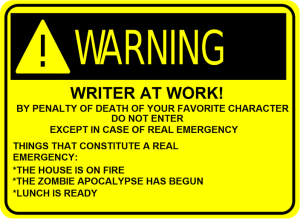Mark Rubinstein's Blog, page 29
March 22, 2014
“You’re Edgy and Irritable” My Wife Says

 Writing is an emotionally draining and solitary business. You spend hour upon hour alone with your thoughts and fantasies, doing your best to order, re-order and transform them into coherent stories people will want to read. Like any other endeavor, you have good days and bad days. Sometimes you feel exhilarated; at other times you feel frustrated and exhausted. As they say, it goes with the territory.
Writing is an emotionally draining and solitary business. You spend hour upon hour alone with your thoughts and fantasies, doing your best to order, re-order and transform them into coherent stories people will want to read. Like any other endeavor, you have good days and bad days. Sometimes you feel exhilarated; at other times you feel frustrated and exhausted. As they say, it goes with the territory.
My wife has noticed what she’s called “carryover” from a day’s writing. She can tell if I’ve...
March 14, 2014
The Resistance Man: A Talk with Martin Walker
 Martin Walker is a senior fellow of a private think tank for CEOs of major corporations. He is also editor in chief emeritus and international affairs columnist for UPI and has been a journalist for the Guardian for many years. He has written five previous novels—all international best sellers—in the Bruno, Chief of Police mystery series. He lives in Washington, D.C. and the Dordogne region of France. His most recent Bruno novel is The Resistance Man.
Martin Walker is a senior fellow of a private think tank for CEOs of major corporations. He is also editor in chief emeritus and international affairs columnist for UPI and has been a journalist for the Guardian for many years. He has written five previous novels—all international best sellers—in the Bruno, Chief of Police mystery series. He lives in Washington, D.C. and the Dordogne region of France. His most recent Bruno novel is The Resistance Man.
Tell us about Bruno Courreges, chief of po...
March 8, 2014
“Graveyard of Memories”: A Talk with Barry Eisler
Barry Eisler’s John Rain novels are the “Tiffany” of assassin-oriented, suspense thrillers. The recently released Graveyard of Memories is a prequel to the other novels in the John Rain series. At the story’s outset, Rain, 20 years old and fresh from Vietnam, is a courier for the CIA. He suddenly finds himself threatened on all sides: he must survive the yakuza (the Japanese mob) and other imminent sources of danger. He falls in love with Sayaka, a beautiful wheelchair-bound young woman. Bala...
March 3, 2014
My Day Behind Bars

 It looked like something out of a nightmare—the Fishkill Correctional Facility at Beacon, NY. It was a huge, rambling series of buildings surrounded by chain link fences and concertina wire. I shivered at the thought of spending twenty years in this hellhole—amid society’s castaways, extruded from the world. It reminded me of the ninth level of Dante’s inferno.
It looked like something out of a nightmare—the Fishkill Correctional Facility at Beacon, NY. It was a huge, rambling series of buildings surrounded by chain link fences and concertina wire. I shivered at the thought of spending twenty years in this hellhole—amid society’s castaways, extruded from the world. It reminded me of the ninth level of Dante’s inferno. I was patted down and wanded. I walked through a metal detector. I removed my shoes, which were examined. I was led by a guard down a long corridor.
Walking deeper into the belly of the beast, the guard and I passed through a series of electronically controlled doors that slid open and shut behind us. Gray cinderblock walls and cement floors added to the sense of dislocation and otherworldliness.
As a forensic psychiatrist, I was asked to evaluate an inmate in the Maximum Security Block. He was doing 25 years for armed robbery. Acting as his own attorney, he’d lodged a civil suit against the State of New York. His legal papers (all hand-written in block print) alleged the prison air contained toxic particulates causing breathing problems. Prison doctors thought he might be clinging to a delusional belief, in addition to being a convicted felon. They also wanted to know if he was competent to represent himself as a pro se plaintiff in a civil lawsuit. Even though he was a prisoner of the state, he was exercising his constitutional right to file a suit in a court of law.
In the Medical Unit—behind a series of more sliding doors and bars, I was escorted to a small room with a table and two chairs. The guard left to bring the plaintiff/inmate for his examination.
Sam, the inmate, was a short, wiry, 30 year old black man. I’d read through his records and legal filings. It was obvious he was your proverbial jailhouse lawyer. He greeted me with a firm handshake. Sitting across the narrow table, he smiled readily, and spoke intelligently. I asked about his breathing; his prison time; his thoughts; feelings; and about prison life. He spoke of the brutality of his childhood days in a series of foster homes, and his later life of crime. He was articulate and obviously intelligent.
His words were spoken in logical, sequential order, and made complete sense. He wasn’t hallucinating. Nor did he think the state was poisoning him, or pumping toxic fumes into his cell. In other words, his lawsuit wasn’t based on some delusional belief. He was perfectly sane and quite able to represent himself in court.
He knew I was interviewing him for the state. Yet, he didn’t relate to me as an adversary. He was an affable guy, and I liked him. And he liked me. He even asked about my life. Though he knew I’d prepare a report about his mental capacity, he talked with me as though I was just another inmate.
At the end of the examination, he said, “So, Doc, what’s your diagnosis? Am I crazy?”
“You know I’m not allowed to divulge my findings.”
“I know. I’m just testin’ ya, Doc. You’re a good guy. I like you.”
“I like you, too.”
“Don’t worry Doc, when this goes to trial, I’ll go easy on cross-examination.”
We both smiled as I gathered my papers. Then I pressed the call-button on the battery-operated unit attached to my belt. A guard appeared, and I was escorted out.
Heading toward my car, I realized if Sam had a different upbringing, he could have become an attorney or an accomplished professional.
Though the case never came to trial—it probably settled out of court—I still think about Sam and the wasted life he was living.

My Day Behind Bars
 It looked like something out of a nightmare—the Fishkill Correctional Facility at Beacon, NY. It was a huge, rambling series of buildings surrounded by chain link fences and concertina wire. I shivered at the thought of spending twenty years in this hellhole—amid society’s castaways, extruded from the world. It reminded me of the ninth level of Dante’s inferno.
It looked like something out of a nightmare—the Fishkill Correctional Facility at Beacon, NY. It was a huge, rambling series of buildings surrounded by chain link fences and concertina wire. I shivered at the thought of spending twenty years in this hellhole—amid society’s castaways, extruded from the world. It reminded me of the ninth level of Dante’s inferno.
I was patted down and wanded. I walked through a metal detector. I removed my shoes, which were examined. I was led by a guard down a...
My Time Behind Bars
 It looked like something out of a nightmare—the Fishkill Correctional Facility at Beacon, NY. It was a huge, rambling series of buildings surrounded by chain link fences and concertina wire. I shivered at the thought of spending twenty years in this hellhole—amid society’s castaways, extruded from the world. It reminded me of the ninth level of Dante’s inferno.
It looked like something out of a nightmare—the Fishkill Correctional Facility at Beacon, NY. It was a huge, rambling series of buildings surrounded by chain link fences and concertina wire. I shivered at the thought of spending twenty years in this hellhole—amid society’s castaways, extruded from the world. It reminded me of the ninth level of Dante’s inferno.
I was patted down and wanded. I walked through a metal detector. I removed my shoes, which were examined. I was led by a guard down a...
March 2, 2014
Tortured Souls Tell Great Stories
(Ahab, Moby Dick)
The king goes slowly insane because of his mistakes and his daughters’ perfidy.
(Lear, King Lear)
She was forced to make a choice between two unbearable, unthinkable options.
(Sophie, Sophie’s Choice)
Their marriage, finances and lives were bankrupt; and now he is suspected of her murder.
(Nick and Amy Dunne, Gone Girl)
She could not stop remembering the sound of the spring lambs being slaughtered.
(Clarice Starling, The Silence of the Lambs)
Take the character to hell (either physically or mentally), and if well-drawn, the reader will really care about this person. All of us can relate to the torture of being alive in an indifferent world.
When I think about building a character for a novel, my task is to create someone who inhabits a world where aspects of his personality and life-experiences are the spawning grounds for an emotionally charged and conflicted existence.
Stephen King’s On Writing advises writers to imbue their characters with honest voices, to make them people with faults, passions, weaknesses and strengths. These characteristics make them human. We can relate to them, whether they be a king; concentration camp survivor; detective; duplicitous couple; or sea captain, because their fictional lives intersect with ours and make us connect with them. The link can be one of intense compassion or absolute revulsion, but nonetheless, it is a bond. It relates to the character’s tortured and anguished existence.
All of us have felt victimized by the randomness of life. No one has escaped the seemingly unfair punishment brought upon us through pure happenstance. Recent events like the 2001 terrorist attacks or the devastation brought about by storms like Sandy remind us of the tenuous nature of existence.
Worthy fiction draws us into a world where the characters are emotionally driven and tortured. Their mistakes and triumphs must resonate as real. Human nature doesn’t change. That’s why the stories in the Iliad and the collection of works by Shakespeare are as relevant now as they were eons ago.
There’s plenty of advice about developing characters. Guidance ranges from drawing a detailed profile of each one, describing physical appearance and personality traits, to making a timeline charting the character’s history in the context of the novel.
All of this is solid and practical guidance.
But in my opinion, what matters most is this: the character must suffer turmoil and torture, presented in the context of a story that allows the reader to surrender control and enter the fictional but believable world you have created.
To varying degrees, and at different times throughout our lives, we are all tortured souls.
The life of a well-developed, memorable fictional character must be, too.
Mark Rubinstein
Author, Mad Dog House and Love Gone Mad
March 1, 2014
Tortured Souls Tell Great Stories
 Poisoned by his lustful quest for vengeance, his obsession carries his crew to their demise.
Poisoned by his lustful quest for vengeance, his obsession carries his crew to their demise.
(Ahab, Moby Dick)
The king goes slowly insane because of his mistakes and his daughters’ perfidy.
(Lear, King Lear)
She was forced to make a choice between two unbearable, unthinkable options.
(Sophie, Sophie’s Choice)
Their marriage, finances and lives were bankrupt; and now he is suspected of her murder.
(Nick and Amy Dunne, Gone Girl)
She could not stop remembering the sound of the spring lambs being slaug...
February 23, 2014
Still Relevant: A Talk With A Librarian
 Cynde Bloom Lahey began working in a library during high school. She received a Master’s Degree in Library Science from Southern Connecticut University in 1989 and has been a librarian throughout her professional life. She is now Programming Specialist at the Norwalk Public Library.
Cynde Bloom Lahey began working in a library during high school. She received a Master’s Degree in Library Science from Southern Connecticut University in 1989 and has been a librarian throughout her professional life. She is now Programming Specialist at the Norwalk Public Library.What changes have you seen in libraries over the last few years?
When I first became a librarian, we had a manual circulation system. Technology has changed everything and made things much easier in so many ways. There are myths about libraries no longer being warehouses of books, and librarians will have to find different ways of staying relevant. Historically, libraries have always been a cultural community center for people. Now, because of technology, the roles of libraries have expanded exponentially.
Libraries have evolved from being places to check out books, to places where people spend a lot more time. Library programming involves arranging events and programs tailored for people in the community. These include educational events, forums, book discussions, author appearances, concerts, theatrical performances, and art exhibits. Children’s services have always been a priority—which include story hours and other activities. We want to help instill a love of reading early in life; and create a safe, friendly atmosphere.
Speaking of children, I’ve noticed the vast majority of library visitors are very young and older people. Are libraries doing more to appeal to those between the ages of 30 and 65?
Yes. With the busy lives people lead, it’s difficult them to find time to go to the library. Parents come with children; but today, much of our planning is centered on teens. For a while, teens were a lost population to us. Young children would come, we would lose them during their teens, and they would return eventually when they had small children—to the children’s section.
We’ve begun changing that situation by having computer classes and job search seminars. We even have health-related programs. A big area of expansion involves book groups. They’ve become one of the most central services a library performs. We offer options for book groups meeting at home, but we’ve created and now coordinate book groups meeting at the library.
What does your library do for book groups that meet at people’s homes?
We have our book group collection. If a group will be discussing a book and calls the library in advance to tell us they need multiple copies in paperback, our library will buy them. We will also make sure we have an e-book copy, and if available, an audio book of the title so people can choose whichever format they prefer. I know of one library that provides librarians to go to the home and lead book discussions. It’s a “librarians on loan” program. I’ve led several home book groups in my career.
Some studies indicate that in lower-income communities, libraries are rated as being vitally important, more so than in upper-middle class communities.
Urban libraries definitely have higher usage than suburban ones. The most important part of a library’s mission is to provide free and equal access to information. Our philosophy at the Norwalk Public Library is to embrace that sentiment and to instill the joy of reading for our diverse community, in a clean and welcoming environment. A very poor person and a multi-millionaire visit our library, and receive the same services. They have access to the same information, can use the computers, and read or check out books. It’s a community place where people feel equal. In lower-income neighborhoods, the library has become fundamental for gaining knowledge and for expanding horizons through reading and attending cultural events.
Do you feel the future of libraries will be much more about services provided than the physical books they contain?
Absolutely. The most important part of a public library is embodied in the services it provides. Our function is to be responsive to our patrons’ interests. Content can be delivered in many different formats. We must make certain services are provided and patrons’ needs are met. Above all, a library serves a community of people, and its staff’s mission is to be attuned to the town in which the library is situated.
As for services, our author events are very popular. Many people come every week to meet an author and hear about a new book or about writing. Some people live alone and find the library a safe, friendly and comforting place to spend time. We get all kinds of questions from patrons—ranging from things like “What is the bus schedule?” to “Can you recommend a good book?” or “Can you give me one-on-one instruction on computer use?”
How about computer classes?
The Norwalk Library offers them in English and Spanish.
Do you foresee the day when the bulk of lending will be downloadable as opposed to the physical product, whether DVDs, CDs, or books?
No. The downloadable content is simply another format similar to books, CDs and DVDs. Recently, we’ve seen downloaded content level off in popularity. Every year, right after Christmas, when people get new devices as gifts, we see an upsurge in downloads. That lasts for a while, but it appears to have flattened out. Only between 2 to 5 percent of library usage is downloadable. Physical books, CDs and DVDs are still being checked out. I’m trying to determine if, as time passes, young people accustomed to doing nearly everything digitally, will bring downloaded content more to the fore. But when I’ve talked with teenagers and college students, I learned they love to hold a real book in their hands. Physical books and e-books aren’t mutually exclusive. They’re simply different formats for obtaining content and experiencing reading pleasure.
So you see the prognosis for libraries as an excellent one, and feel they will thrive?
Yes, I think so. We’re really evolving into centers of instruction to help people navigate through a maze of electronic information and resources. But people still want to find a good book to read, a movie to watch, and they use our resources. Librarians’ roles have always been to disseminate information. We must make sure to maintain a friendly, reachable presence. A library staff must be visible, approachable, and available. You know, some libraries have passport offices. Some have cafes. Others, including Norwalk Public Library, have tax forms available as well as volunteer income tax assistants from AARP. Believe it or not, for some people, the first time they ever came to the library was to have their income taxes done. We also have Affordable Care Act workshops to help with enrollments.
Norwalk has a substantial Hispanic community. We have staff members who speak Spanish and they’ve forged relationships with these patrons. We had a Colombian poet give a reading in Spanish, and had a huge audience. We’re expanding to include programs in Italian and other languages.
All these activities give people a central location for a multitude of services, and provide a sense of belonging to our community. That’s what really counts.
Still Relevant? A Talk with a Librarian

Cynde Bloom Lahey
Cynde Bloom Lahey began working in a library during high school. She received a Master’s Degree in Library Science from Southern Connecticut University in 1989 and has been a librarian throughout her professional life. She is now Programming Specialist at the Norwalk Public Library.
What changes have you seen in libraries over the last few years?
When I first became a librarian, we had a manual circulation system. Technology has changed everything and made things much easier in...



